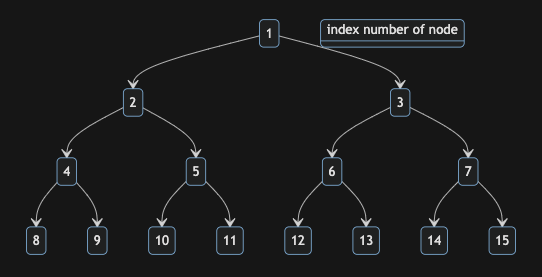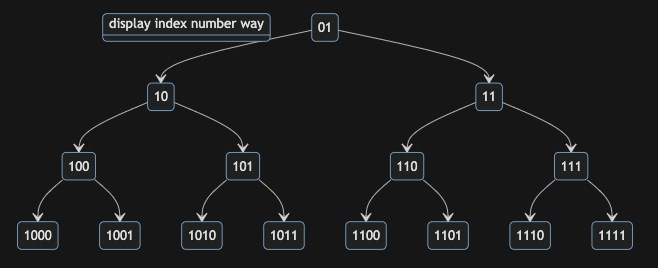概要・背景
この記事ではヒープの説明等はしないのでヒープについて知りたい人は他の記事をあたって下さい。
ヒープの構築は配列を用いて実装されていることがほとんどです。
そこで本記事ではポインタを用いてヒープを構築してみたいと思います。
仕様
以下のようなクラスを用意します。
クラスは根とヒープの大きさ(要素が何個入っているか)の情報のみを持ちます。
またそれぞれのノードの実態としてNodeという構造体を使用します。
# ifndef _MYHEAP_H_
# define _MYHEAP_H_
class MyHeap {
private:
struct Node {
int value;
Node *left, *right;
Node() : left(nullptr), right(nullptr) {}
Node(int x) : value(x), left(nullptr), right(nullptr) {
}
Node *
operator->() {
return this; // pointer
}
};
// 根
Node *root;
int size;
public:
// constructor
MyHeap();
// destructor
~MyHeap();
// function
void push(int);
int top();
void pop();
void display();
};
# endif //_MYHEAP_H_
push ヒープへの追加
配列を用いたヒープでは挿入が、配列の末尾に新しい要素を追加すればいいのでO(1)で実現できます。
ポインタを使っている場合は末尾に挿入することを考えると、末尾まで根から辿って行かなければならず、処理にlog2(n)かかってしまいます。
そこで下で説明するような性質を利用し、「挿入場所の方向に進みつつ、ノードを交換するべき場所で交換する」という方針をとります。
性質

上図のように根から葉に向かって番号を振っていきます。
そして下図のように振られた番号を2進数(bit表示)で表します。

以下のような操作で根から各ノードへ進むことができます。
ノードのbit表示における、左から2番目の文字から最後(一番右)の文字にむかって、
0だったら左のノードへ進む
1だったら右のノードへ進む
例として、木の根(番号1)から番号5が振られたノードに進むことを考えます。
番号5のビット表示は101です。 // 現在地は番号1
左から2番目の文字は0なので左に進む // 現在地は番号2
左から3番目の文字は1なので右に進む // 現在地は番号5 (到達)
以上のような性質を利用して道を進みます。
また以下のコードにおけるgetDepth関数は、番号をビット表示した時の長さを取得しています。getDepth(5)は5のbit表示が101なので3を返します。
int getDepth(int num) {
int cnt = 0;
while (num >>= 1) {
cnt++;
}
return cnt;
}
void MyHeap::push(int val) {
size += 1;
Node appendNode = Node(val);
if (size == 1) {
*root = appendNode;
return;
}
// rootと交換判定
if (root->value > (appendNode->value)) {
appendNode->left = root->left;
appendNode->right = root->right;
Node temp = *root;
*root = appendNode;
appendNode = temp;
appendNode->left = nullptr;
appendNode->right = nullptr;
}
// 行くべき方向の深さ
int depth = getDepth(size);
// 今どこのノードにいるか
// ポインタのポインタ渡し node変更するとrootも変わる
Node *node = root;
// cout << "size: " << size << " size_bit: " << bitset<8>(size) << endl;
while (depth--) {
int way = (size >> depth) & 1; // depthビット目のビット値を取得(0or1)
// way==1 右へ way==0 左へ
// 参照渡し
Node *&nextNode = way ? node->right : node->left;
if (nextNode == nullptr) {
nextNode = new Node();
*nextNode = appendNode;
break;
}
// nextNodeと交換すべきか判定
if (nextNode->value <= appendNode->value) {
// 交換しなくていい
//nodeを更新して処理続行
node = nextNode;
} else {
// 交換
Node temp = *nextNode;
*nextNode = appendNode;
nextNode->left = temp->left;
nextNode->right = temp->right;
appendNode = temp;
appendNode->left = nullptr;
appendNode->right = nullptr;
node = nextNode;
}
}
return;
}
top 根の値を返す
int MyHeap::top() {
if (root == nullptr) {
cout << "this tree is empty" << endl;
return 0;
}
return root->value;
}
pop 根を削除してヒープの再構築
配列を用いたヒープでは根を削除した後、末尾を根に移動してヒープを再構築します。
ポインタを用いたヒープでも同じアイディアを採用しました。
しかし、末尾を探索する必要があるので、配列時に比べ余分にlog2(n)回時間要します。
void MyHeap::pop() {
// 行くべき方向の深さ
int depth = getDepth(size);
Node *node = root;
while (depth--) {
int way = (size >> depth) & 1;
Node *&nextNode = way ? node->right : node->left;
if (nextNode->left == nullptr) {
// 末端とrootを入れ替える
root->value = nextNode->value;
way ? node->right = nullptr : node->left = nullptr;
delete nextNode;
break;
}
node = nextNode;
}
// Heap再構築
queue<Node *> que;
que.push(root);
while (!que.empty()) {
Node *node = que.front();
que.pop();
if (node == nullptr) break;
// left right 小さい方と交換 or
if (node->left && node->right) {
if (node->left->value < node->right->value) {
// left smaller
if (node->left->value < node->value) {
// switch
int temp = node->value;
node->value = node->left->value;
node->left->value = temp;
}
que.push(node->left);
} else {
// right smaller
if (node->right->value < node->value) {
// switch
int temp = node->value;
node->value = node->right->value;
node->right->value = temp;
}
que.push(node->right);
}
} else if (node->left == nullptr && node->right == nullptr) {
break;
} else if (node->left) {
if (node->left->value < node->value) {
// switch
int temp = node->value;
node->value = node->left->value;
node->left->value = temp;
}
que.push(node->left);
} else {
if (node->right->value < node->value) {
// switch
int temp = node->value;
node->value = node->right->value;
node->right->value = temp;
}
que.push(node->right);
}
}
size -= 1;
if (size == 0) {
root = nullptr;
}
return;
}
myHeap.h
# ifndef _MYHEAP_H_
# define _MYHEAP_H_
class MyHeap {
private:
struct Node {
int value;
Node *left, *right;
Node() : left(nullptr), right(nullptr) {}
Node(int x) : value(x), left(nullptr), right(nullptr) {
}
Node *
operator->() {
return this; // pointer
}
};
// 根
Node *root;
int size;
public:
// constructor
MyHeap();
// destructor
~MyHeap();
// function
void push(int);
int top();
void pop();
void display();
};
# endif //_MYHEAP_H_
myHeap.cpp
# include "myHeap.h"
# include <bitset>
# include <iostream>
# include <queue>
using namespace std;
MyHeap::MyHeap() {
root = new Node();
size = 0;
// cout << "construct my heap" << endl;
}
MyHeap::~MyHeap() {
delete root;
size = 0;
// cout << "destruct my heap" << endl;
}
int getDepth(int num) {
int cnt = 0;
while (num >>= 1) {
cnt++;
}
return cnt;
}
void MyHeap::push(int val) {
size += 1;
Node appendNode = Node(val);
if (size == 1) {
*root = appendNode;
return;
}
// rootと交換判定
if (root->value > (appendNode->value)) {
appendNode->left = root->left;
appendNode->right = root->right;
Node temp = *root;
*root = appendNode;
appendNode = temp;
appendNode->left = nullptr;
appendNode->right = nullptr;
}
// 行くべき方向の深さ
int depth = getDepth(size);
// 今どこのノードにいるか
Node *node = root;
while (depth--) {
int way = (size >> depth) & 1;
Node *&nextNode = way ? node->right : node->left;
if (nextNode == nullptr) {
nextNode = new Node();
*nextNode = appendNode;
break;
}
if (nextNode->value <= appendNode->value) {
node = nextNode;
} else {
// 交換
Node temp = *nextNode;
*nextNode = appendNode;
nextNode->left = temp->left;
nextNode->right = temp->right;
appendNode = temp;
appendNode->left = nullptr;
appendNode->right = nullptr;
node = nextNode;
}
}
return;
}
int MyHeap::top() {
if (root == nullptr) {
cout << "this tree is empty" << endl;
return 0;
}
return root->value;
}
void MyHeap::pop() {
// 行くべき方向の深さ
int depth = getDepth(size);
Node *node = root;
while (depth--) {
int way = (size >> depth) & 1;
Node *&nextNode = way ? node->right : node->left;
if (nextNode->left == nullptr) {
root->value = nextNode->value;
way ? node->right = nullptr : node->left = nullptr;
delete nextNode;
break;
}
node = nextNode;
}
// Heap再構築
queue<Node *> que;
que.push(root);
while (!que.empty()) {
Node *node = que.front();
que.pop();
if (node == nullptr) break;
if (node->left && node->right) {
if (node->left->value < node->right->value) {
// left smaller
if (node->left->value < node->value) {
// switch
int temp = node->value;
node->value = node->left->value;
node->left->value = temp;
}
que.push(node->left);
} else {
// right smaller
if (node->right->value < node->value) {
// switch
int temp = node->value;
node->value = node->right->value;
node->right->value = temp;
}
que.push(node->right);
}
} else if (node->left == nullptr && node->right == nullptr) {
break;
} else if (node->left) {
if (node->left->value < node->value) {
// switch
int temp = node->value;
node->value = node->left->value;
node->left->value = temp;
}
que.push(node->left);
} else {
if (node->right->value < node->value) {
// switch
int temp = node->value;
node->value = node->right->value;
node->right->value = temp;
}
que.push(node->right);
}
}
size -= 1;
if (size == 0) {
root = nullptr;
}
return;
}
bool is_pow2(int x) {
if (x == 0) {
return false;
}
return (x & (x - 1)) == 0;
}
void MyHeap::display() {
queue<Node *> que;
if (root == nullptr) {
cout << "heap is empty" << endl;
return;
}
que.push(root);
int cnt = 1;
while (!que.empty()) {
Node *node = que.front();
if (node == nullptr) break;
que.pop();
cout << node->value << " ";
if (is_pow2(cnt + 1)) {
cout << endl;
}
cnt++;
if (node->left != nullptr) que.push(node->left);
if (node->right != nullptr) que.push(node->right);
}
}
テストコード
# include <algorithm>
# include <ctime>
# include <iomanip>
# include <iostream>
# include <random>
# include <vector>
# include "myHeap.h"
using namespace std;
uint64_t get_rand_range(uint64_t min_val, uint64_t max_val) {
// 乱数生成器
static std::mt19937_64 mt64(0);
// [min_val, max_val] の一様分布整数 (int) の分布生成器
std::uniform_int_distribution<uint64_t> get_rand_uni_int(min_val, max_val);
// 乱数を生成
return get_rand_uni_int(mt64);
}
void displayArray(const vector<int> &arr) {
for (int i = 0; i < arr.size(); i++) {
cout << arr[i] << " ";
}
cout << endl;
}
bool isSorted(const vector<int> &arr) {
bool flag = true;
for (int i = 1; i < arr.size(); i++) {
flag &= arr[i - 1] <= arr[i];
}
return flag;
}
int main(void) {
const int TEST_CASE_SIZE = 100000;
cout << "test case size : " << TEST_CASE_SIZE << endl;
cout << endl;
// init test case
vector<int> test1;
vector<int> test2;
for (int i = 0; i < TEST_CASE_SIZE; i++) {
test1.push_back(get_rand_range(INT64_MIN, INT64_MAX));
}
copy(test1.begin(), test1.end(), back_inserter(test2));
// MyHeap
cout << "===== MyHeap =====" << endl;
MyHeap myHeap = MyHeap();
if (isSorted(test1)) {
cout << "sorted" << endl;
} else {
cout << "not sorted" << endl;
}
int start1 = clock();
for (int i = 0; i < test1.size(); i++) {
myHeap.push(test1[i]);
}
int middle1 = clock();
cout << "heap building time: ";
cout << fixed << setprecision(15) << 1.0 * (middle1 - start1) / CLOCKS_PER_SEC << endl;
for (int i = 0; i < test1.size(); i++) {
test1[i] = myHeap.top();
myHeap.pop();
}
int end1 = clock();
cout << "remove time : ";
cout << fixed << setprecision(15) << 1.0 * (end1 - middle1) / CLOCKS_PER_SEC << endl;
cout << "whole time : ";
cout << fixed << setprecision(15) << 1.0 * (end1 - start1) / CLOCKS_PER_SEC << endl;
if (isSorted(test1)) {
cout << "sorted" << endl;
} else {
cout << "not sorted" << endl;
}
cout << endl;
// heapq
cout << "===== c++ library =====" << endl;
if (isSorted(test2)) {
cout << "sorted" << endl;
} else {
cout << "not sorted" << endl;
}
int start2 = clock();
make_heap(test2.begin(), test2.end());
int middle2 = clock();
cout << "heap building time: ";
cout << fixed << setprecision(15) << 1.0 * (middle2 - start2) / CLOCKS_PER_SEC << endl;
sort_heap(test2.begin(), test2.end());
int end2 = clock();
cout << "sort_heap time : ";
cout << fixed << setprecision(15) << 1.0 * (end2 - middle2) / CLOCKS_PER_SEC << endl;
cout << "whole time : ";
cout << fixed << setprecision(15) << 1.0 * (end2 - start2) / CLOCKS_PER_SEC << endl;
if (isSorted(test2)) {
cout << "sorted" << endl;
} else {
cout << "not sorted" << endl;
}
cout << endl;
// time diff
cout << "whole time diff" << endl;
cout << fixed << setprecision(15) << 1.0 * abs((end1 - start1) - (end2 - start2)) / CLOCKS_PER_SEC << endl;
cout << "whole time ratio (MyHeap/library)" << endl;
cout << fixed << setprecision(15) << 1.0 * (end1 - start1) / (end2 - start2) << endl;
cout << endl;
return 0;
}
実行
$ g++ test.cpp myHeap.cpp
$ ./a.out
test case size : 100000
===== MyHeap =====
not sorted
heap building time: 0.021775000000000
remove time : 0.160527000000000
whole time : 0.182302000000000
sorted
===== c++ library =====
not sorted
heap building time: 0.007654000000000
sort_heap time : 0.068640000000000
whole time : 0.076294000000000
sorted
whole time diff
0.106008000000000
whole time ratio (MyHeap/library)
2.389467061630010
時間計算量
結果より、ポインタを用いたヒープは配列を用いた場合の2~3倍くらいかそれ以上かかりますね。
TEST_CASE_SIZEが小さい(100とか)場合はその差が顕著です。
push1回あたりlog2(n)
heapに追加するのにpushをn回呼ぶ
ヒープ構築作業でnlog2(n)
topはO(1)
pop1回あたり2log2(n)
pop呼び出しがn回
要素の取り出しで2nlog2(n)
以上あわせて
3nlog2(n)
といったところでしょうかね。
配列ヒープは最悪時間計算量nlog2(n)なので、まぁこんなもんじゃないでしょうか。
ポインタを用いたヒープで、要素の取り出しをlog2(n)で実装する方法を思いついた有能な方は是非教えて下さい。
参考